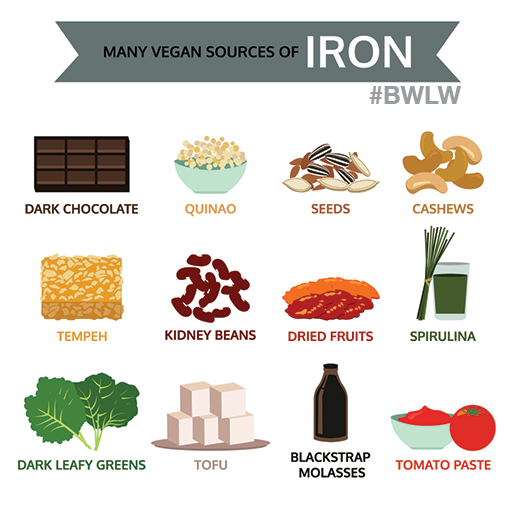Many people go to the gym and pump iron to tone and transform their bodies, but let’s not forget that there is another type of iron that is good for our bodies. Iron, the nutritional kind, has immense benefits, but that doesn’t seem to stop iron deficiency from being a menace, affecting quite a large number of people. As far as the importance of iron goes, it is involved in countless bodily functions that guarantee your health in the long run. The NIH suggests that on a daily basis, adults should consume a minimum of 18 milligrams of the nutrient. (Here are the RDA’s iron guidelines based on age and gender)
While many recognize meat as a prime source of iron, it is important to know of other quality sources of the nutrient as well. Check out following foods and supplements for good sources of iron. Anemia is terrible and no one should have to suffer through it. (Speak with your doctor about anemia and iron deficiency. Don’t guess. Talk with an expert before you attempt to medicate yourself or regulate your iron levels.)
Kidney beans
Starting you off are kidney beans, which haven’t gotten the right recognition for being proper sources of iron. This is due to their hefty value in providing other nutritional benefits, giving you fiber, potassium magnesium, folate, vitamin B1, protein and more. Besides providing 15.1 mg of iron to the body per cup, they are also great help for keeping regular due to 16.5 grams of dietary fiber per cup.
Cereals for an “iron” breakfast
That’s right. Breakfast cereals have been found to come packing a lot of iron nutrition in them. It might not be as natural as other food sources, but the cereal manufacturers have taken it upon themselves to have their brands fortified with a good amount of iron to kick-start your day, every day. However, it is important to make sure that you make a good choice in terms of quality, sugar content and ingredients since not all cereals have the same iron capacity. Don’t be surprised when you find some that are lacking iron completely. Always read the labels before you make a purchase. Oatmeal is at the top of the list with 13.9 mg of iron per cup. Some good examples of cereals that pack a lot of iron are Whole Grain Total, All-Bran and Grape Nuts. Toss in some fruit for sweetness and you are all set.
Lentils
The lentils provide potassium, antioxidants, folates, and iron. In fact, it has 6.6 mg of iron per cup. Much like quinoa, lentils more often than not find themselves being included in a variety of recipes, making them quite versatile naturally. Add lentils to your home-cooked meals and you’ll be doing your body a huge favor. They are great in soups, burgers, salads, in pita bread or as a side dish.
Chocolate
Apart from lowering your stress levels and enhancing the brain’s cognitive abilities, chocolate can also offer a sweet source of iron. A bar of dark chocolate contains approx. 13 mg of iron (162 grams). Milk chocolate contains about 3.9 mg per cup. Just make sure that you keep that sweet tooth in check, as chocolate is not particularly low-calorie. If you’re going to consume chocolate, go for the more rich cocoa content like 85% cocoa, as this has less sugar and power-packs more health benefits to the body. Dark chocolate is the key. A little square or two will do at one time for a snack with the added benefit of iron.
Blackstrap molasses
Lastly, I want to suggest a sweetener that packs a lot of iron that you can use in recipes, tea and smoothies. Blackstrap molasses has 3.5 mg of iron per tablespoon. It also contains calcium, copper and manganese. Drizzle a little over hot cereal. Use it in a marinade. Just be mindful of the sugar content. (More info)
 In addition to these foods, you can also obtain iron from soy beans, quinoa, grits, chickpeas, seeded bagel, tomato paste, sweet potatoes made into gnocchi, tofu, raisins, maple syrup, kale, spinach, dried apricots, etc. If you have a tough time remembering what foods contain iron, simply do your research, make a list and take that list to the grocery store with you.
In addition to these foods, you can also obtain iron from soy beans, quinoa, grits, chickpeas, seeded bagel, tomato paste, sweet potatoes made into gnocchi, tofu, raisins, maple syrup, kale, spinach, dried apricots, etc. If you have a tough time remembering what foods contain iron, simply do your research, make a list and take that list to the grocery store with you.
Of course… Iron supplements
As it turns out, that supplements also offer great benefits when it comes to getting enough iron. If you would prefer to take them, you have more than enough these days. However, the final result of having to turn to supplements may simply mean that you’re not eating an iron-rich diet. There are extreme cases for adults where one needs to take iron supplements during pregnancy, during illness or while dealing with heavy period. In such cases, you need expert advice. Your doctor/medical professional will direct you accordingly on which iron supplement you will take and on which dosage.
Iron supplements include, Elite Iron, Feosol, Femiron, Hemocyte, Fergon iron supplement, Bifera and Auryxia. Again, speak with a doctor before trying to self medicate. There are side effects, the most common being constipation.
There are supplements and meat-free foods that one can opt for in order to boost his/her iron intake in the body, conveniently avoiding iron deficiency. Now that you know how to get more iron in your body, it’s time to start implementing these foods and supplements regularly.
References
- http://greatist.com/eat/surprising-foods-high-in-iron
- http://www.everydayhealth.com/pictures/foods-high-in-iron/#07
- http://www.mayoclinic.org/drugs-supplements/iron-supplement-oral-route-parenteral-route/description/drg-20070148

Comment Via Facebook